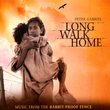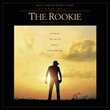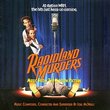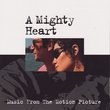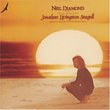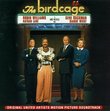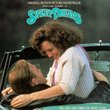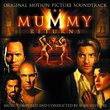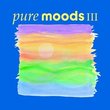| All Artists: Thomas Newman, The Ink Spots Title: Revolutionary Road Members Wishing: 0 Total Copies: 0 Label: Nonesuch Original Release Date: 1/1/2008 Re-Release Date: 12/23/2008 Album Type: Soundtrack Genres: Pop, Soundtracks Style: Number of Discs: 1 SwapaCD Credits: 1 UPC: 075597983753 |
Search - Thomas Newman, The Ink Spots :: Revolutionary Road
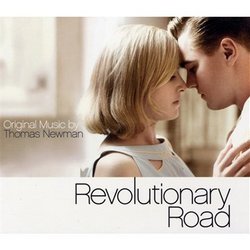 | Thomas Newman, The Ink Spots Revolutionary Road Genres: Pop, Soundtracks
Thomas Newman composed and conducted this original soundtrack to Revolutionary Road, the film based on the classic novel by Richard Yates. Revolutionary Road is a compelling tale of a beautiful young couple's unraveling re... more » |
Larger Image |
CD DetailsSynopsis
Product Description Thomas Newman composed and conducted this original soundtrack to Revolutionary Road, the film based on the classic novel by Richard Yates. Revolutionary Road is a compelling tale of a beautiful young couple's unraveling relationship, set in angst-ridden, mid-fifties, Connecticut suburbia. The film stars Kate Winslet and Leonardo DiCaprio, reunited on the screen for the first time since Titanic. They are joined by fellow Titanic star Kathy Bates in a key supporting role. Thomas Newman is an eight-time Oscar nominee, as well as an Emmy and Grammy Award winner for his work on Six Feet Under and American Beauty, respectively. Similar CDsSimilarly Requested CDs
|
CD ReviewsBeautful and original S. Angel | New York, NY | 01/22/2009 (5 out of 5 stars) "Thomas Newman's music so easily evokes emotion and the older songs "The Gypsy" and "Count Every Star" are so classy and romantic. Loves it! I only wish they had included the song from the trailer, "Wild is the Wind" by Nina Simone...otherwise it's a beautiful CD." Definitely good, just not his absolute best Ryan Hunt | 08/03/2009 (4 out of 5 stars) "I'll just say that I have a playlist with select Newman tracks (134 to be exact) from the 11 scores of his I own and every one of these made it onto the list (minus the non-Newman tracks). The playlist was created to capture the compositions that really reflect the thought-provoking sweetness and the emotional depths within Newman's music, or his "signature sounds". The music on this score is very consistent in those regards, though the score is a little short time-wise. However, scores like American Beauty, Shawshank Redemption and Road to Perdition still reign supreme in my books (and thus I must give this 4 stars only because I have heard Newman reach even higher peaks). Still, very good, very solid music to think to, or drift away to." Predictable Newman Jon Broxton | Thousand Oaks, CA | 08/05/2009 (3 out of 5 stars) "It's been almost a decade since Thomas Newman wrote, and was Oscar nominated for, his score for American Beauty. In the intervening period, Newman's work on that film has, arguably, become the most copied piece of music in recent history: the plinking and plonking and rhythmic quirkiness of that score has become cinematic (and televisual) musical shorthand for suburban life, and the things that go on behind the manicured lawns and the white picket fences. Thomas Newman has collaborated with American Beauty's director, Sam Mendes, twice since then, on Road to Perdition in 2002 and Jarhead in 2005, but Revolutionary Road marks the first return to the setting which initially inspired both men.
Like American Beauty, Revolutionary Road is a tale of suburban malaise and malcontent, hidden behind the sheen of a perfect marriage and the American dream. Based on the novel by Richard Yates and set in Connecticut in the 1950s, it stars Leonardo DiCaprio and Kate Winslet - on screen for the first time together since Titanic - as married couple Frank and April Wheeler. Frank is stuck in a dead-end job, and resorts to alcoholism to escape the mind-numbing drudgery of his life, while April dreams of moving to Paris to become an actress. Their neighbors see a perfect partnership living a perfect life, but in private their marriage is slowly dissolving into an endless cycle of bitter arguments and jealous recriminations, ultimately leading to a devastating conclusion. In musical terms, Revolutionary Road is American Beauty's slightly lusher cousin; Newman makes use of a brassless and woodwindless orchestra, augmented by the usual wondrous array of bizarre instruments - far whistles, ambient freezes, dark matter, backwards vibraphones - played as usual by Newman's familiar collaborators George Doering, Steve Tavaglione, Rick Cox and Michael Fisher. The score often employs the off-kilter rhythms and textures that made American Beauty so popular, but regularly enhances them with a much more conventional orchestral sweep that makes for very pleasant listening indeed. The opening cue, "Route 12", is a perfect example of this mix in styles, in which tinkling, metallic tick-tocks gradually give way to the lovely piano and string main theme, which is very much in the vein of his writing on scores such as The Shawshank Redemption or The Horse Whisperer, albeit more restrained and less grandiose. There is a dream-like, other-worldly aspect to cues such as "Picture Window" and "Unrealistic", in which Newman makes use of feathery, fluttery flutes and ambient string and synth textures, as if alluding to the notion that Frank and April's public image really is as fragile and insubstantial as a wisp of air. Spiky, oddly-metered pianos characterize cues such as "The Bright Young Man", and give way to muted accordions and a contemplative string wash in "Golden People". Darker material, with clattering metallic percussion and menacing piano chords, appears in "Night Woods", while the 9-minute "April" gently weaves a hypnotic musical spell of subtle textures and dream-like drones, before the score rises to an emotionally-heightened finale in the conclusive "Revolutionary Road (End Title)", which reprises the main theme with a satisfying sweep. Fans of Newman's writing will undoubtedly love all this, but to me it seems a rather insubstantial score; agreeable and diverting, but ultimately rather forgettable. I've lost count of the times Thomas Newman has written a score like this, and although there is nothing at all offensive or inappropriate about the music, his scores for this type of film are all starting to blend into one another: American Beauty, Pay It Forward, White Oleander, In the Bedroom, Little Children, and now Revolutionary Road. I'm reluctant to say "if you've heard one you've heard them all", because it's a catch-all phrase and it's clearly not true in the strictest sense, but it really does feel like that these days. It used to be that a new Thomas Newman score was an anticipated event; but honestly, despite Revolutionary Road containing a great deal of generally quite nice music, and unless he's scoring a Pixar animation, it's all getting a bit predictable. " |

 Track Listings (15) - Disc #1
Track Listings (15) - Disc #1
